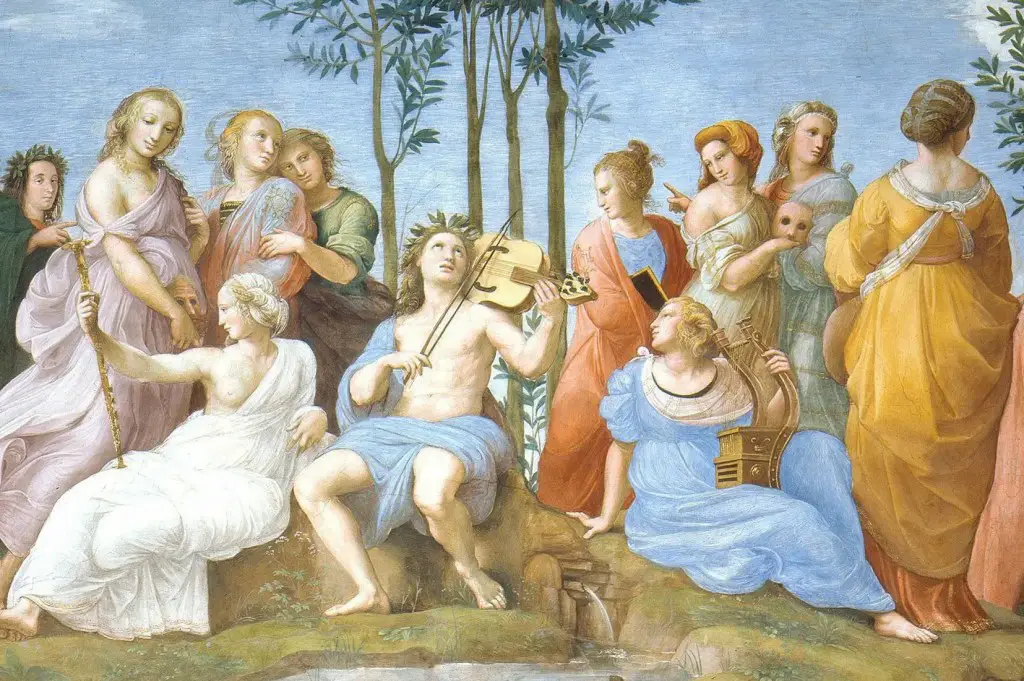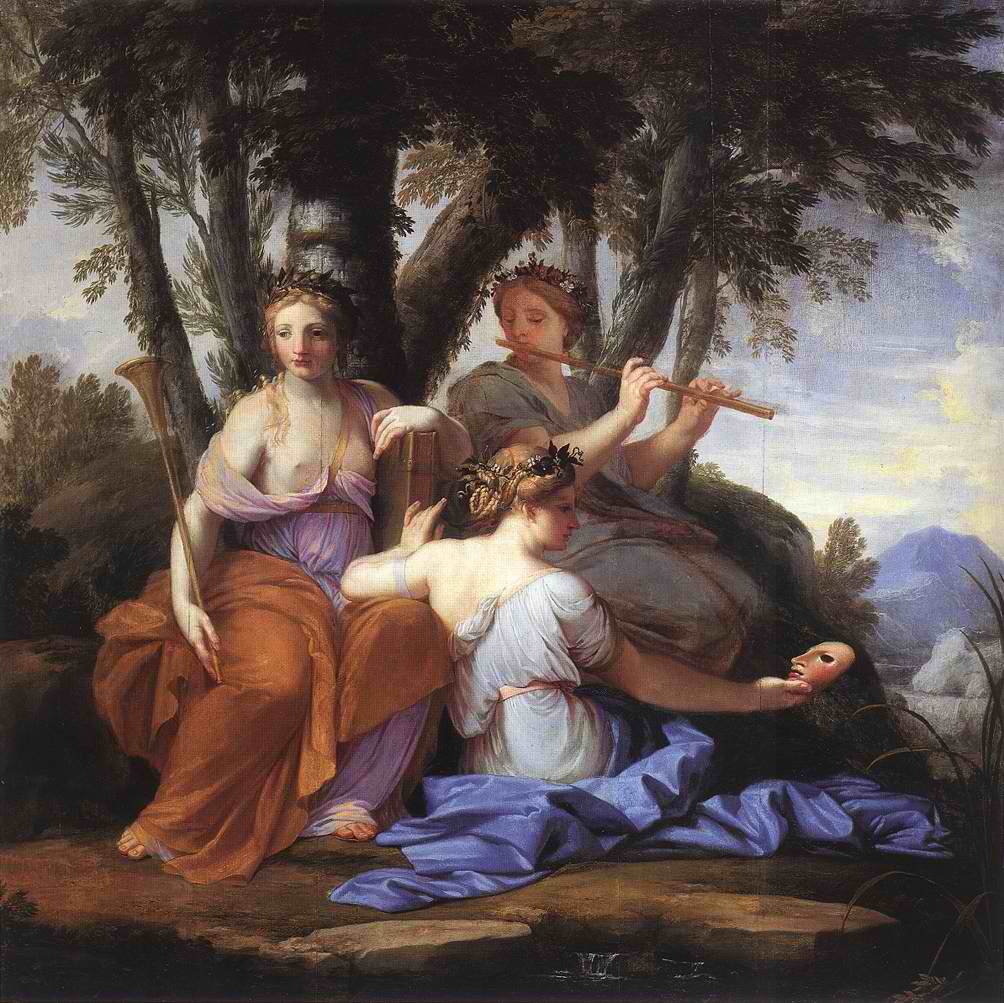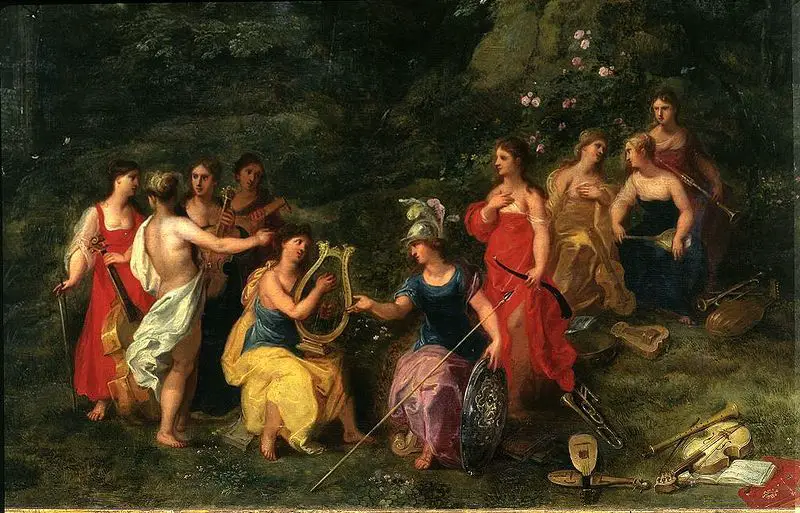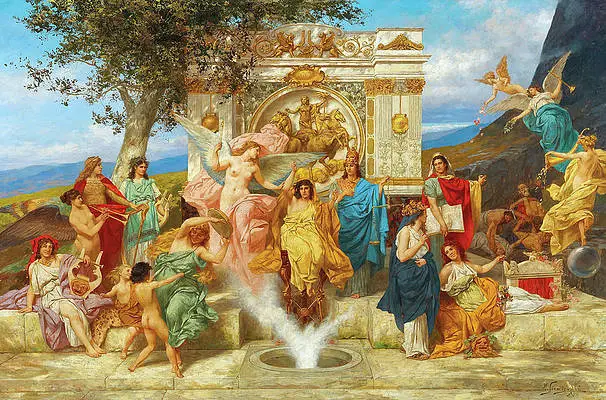The plural and unique Muses gather within themselves the mountains, the waters, the mind, the madness, the ardor, the knowledge, the initiation and sublimate them into poetry. They are the origin of poetry from which everything originates.
di Giovanni Rapazzini
Taken from Poetry and the divine, to be published in November by the Fallone publisher of Taranto
We begin the song from the Heliconian Muses,
[1]
who possess Helicon, a great and divine mountain
and around the fountain with purple reflections with soft feet
they dance and around at the altar of the mighty son of Kronos;
[…] they intertwine dances,
lovable and beautiful, and agile they move their feet.
And from here rising shrouded in thick fog
they advance in the night, singing with wonderful voices
and celebrate […]
the divine lineage of the ever-living high immortals.
[...]
saying the things that are, that will be and that were
with voices in agreement, and the song flows tirelessly,
sweet from the mouths; […]
He fathered them in Pieria, united with his father Cronides,
Mnemosyne, lady of the hills of Eleuthere,
so that they would be oblivion of evils and relief from worries.
Nine nights the prudent Zeus joined her
climbing the sacred bed far away to the immortals;
but when it was a year and the seasons had run their course
as the months passed and many days passed,
she gave birth to nine girls, of one mind, that of singing
they worry in their chests and their hearts are intact from pain,
not far from the highest peak of snowy Olympus;
and there are their splendid choirs and beautiful homes,
and next to them live Cariti and Desiderio
at parties; and sending a lovely voice from his mouth,
they sing and celebrate the laws and wise customs
of all the immortals, raising their delightful voice.
Then they went to Olympus, boasting of the beautiful voice,
with immortal song; and the black earth resounded around
to the hymns, and a lovely noise rose under their feet
as they went to their father who reigns in heaven,
he who has the thunder and the burning lightning,
having defeated his father Cronus by force; and everything is good
among the immortals he disposed equally, and distributed the honors.
[...]
Such is the sacred gift of the Muses to men.
[…] happy is he who the Muses
they love: sweet singing flows from their mouths.
If in fact one, carrying a pain in the soul recent mourning
afflicted dries up his heart, but a bard
servant of the Muses the glories of men of the past
sing and the blessed gods, lords of Olympus,
then he immediately forgets the anguish or the pain
he remembers: the gifts of the Goddesses soon distracted him.
The etymology of the term Muse it is multifaceted and varied, like a river with various tributaries, it goes up from the source, reaches the sea, through different words; all illuminating a valid meaning to understand what and who the Muses are [1]. We begin by scrolling, as a general inspects the troops, the hypotheses of etymes from which the term Muse derives, and each term will reveal a different and valid face for understanding the divinities of poetry. Inhabitants of mountain regions, between Thrace and Macedonia and then settled on Parnassus, the Muses are deities of mountain forests, as demonstrated by the fact that mgr, "mountain" it is one of the supposed derivations of their name.
Between the Castalia source, transparent as glass, and the source of the Cassotis play girls, the Muses, from mous "source". The Muses are aquatic creatures, like the Nymphs, they play in the liquidity of thought. Mens, mind, together with manthainen, “learn” e mnéme, "memory". The Muses are forces of the mind like synapses and neurons. According to Plato in Cratylus (406 a) welcomed within themselves the sense of mosthai: “aspire”, “desire”, “seek”. “The Muse would be the very desire for knowledge, the tension of research, the desire for truth and the path that leads to it” [2]. It's as if i rsi see us had changed sex and found a wooded landscape in the pralaya: the affinities with the themes of Indian wisdom are evident, the Muses think the song in the chest and bring joy by celebrating immortal life, they live near sources of water as the waters of the mind are crossed by rsi.
Diodorus Siculus, in Historical Library 4, 7 derives the name from muein, "start", because the inspired word is an initiation [3], as the stories of Hesiod and Archilochus illustrate [4], both shepherds chosen by the Muses to dedicate their lives to singing and composition. From the same root as mens there are other etyms less, “fury”, “strength”, “ardour” e mania, "folly". Another affinity with Indian wisdom and the origin of the word in the creation ofInno X, 129, is that both concepts are present among the etymological rivers: ardor, Tapas, and of desire, kama [5]. The plural and unique Muses gather within themselves the mountains, the waters, the mind, the madness, the ardor, the knowledge, the initiation and sublimate them into poetry. They are the origin of poetry from which everything originates.

The main myths about the birth of the Muses are told by Diodorus Siculus in the passage of Historical Library 4, 7, from Hesiod in Theogony and by Pindar in Fragment 30. According to Diodorus Siculus the Muses are Titanides, therefore belonging to the divine family preceding the Olympians, daughters of Uranus, the starry sky and Gea, mother earth. For Hesiod they are daughters of Zeus and Mnemosyne, Goddess of Memory to whom the king of the Olympians joined for nine nights in a row giving birth to nine daughters, as united in their souls as instruments of an orchestra. Pindar says that while Zeus was preparing to marry Themis, Goddess of the natural order, he realized that someone was missing to celebrate the wedding which would sanction the power of the new established order. He created the Muses capable of ordering and adorning (kakakosmein) his work, almost as if the Muses were for Greece the silent voice of rta In India.
The Muses not only celebrate creation, but order it, give it shape, meaning and beauty: “The word is not a supplement that is added to the existing, but a power that completes the world and makes it exist in all its splendor” [6]. They harmonize creation with the art of the word [7]. In Greek light and word are said almost in the same way, phos e photis, they have the same root. Just as the vision of any vision occurs thanks to light, so the word illuminates all communicable meanings and the more it conserves the incommunicable, the wiser it is. It generates knowledge and awareness, it gives rise to the world, as in hymn 129 of the tenth mandala of Rigveda [8] and so for Greek wisdom. There is only one world where someone knows the secret of words and music.
The names of the Muses are different because they correspond to different types of inspiration. According to tradition the number was not always nine, but varied between two, three, four and seven to stabilize in the canonical nine with the Theogony of Hesiod. The Muses of the Hesiodic canon are: Calliope, Erato, Euterpe, Polyhymnia, Clio, Melpomene, Thalia, Terpsichore, Urania. Calliope is called "Beautiful voice", she holds a lyre in her hand and symbolizes epic poetry, and for Hesiod it is the most important. Erato, “Lovely”, holds a lyre and protects the poetry of love. Euterpe, “Dilettante”, blows on the flute and is the patroness of lyric poetry and elegy. Polyhymnia, “From many songs” is wrapped in a veil and dictates the pronunciation of the hymns to the Gods. Clio, “Sonora”, handles scrolls and books, is the Muse of the stories told. Melpomene, “She who dances and sings”, wears a sad and gloomy mask, with her is tragedy. Talia, “Fiorente” has a laughing mask, it's comedy. Terpsichore, “Joy of Dance”, holds a lyre with a plectrum and represents dance. Urania, “Celeste” has a globe in her palm, she inspires celestial songs and the harmony of the stars.
Depending on the poet, the Muses inspire one or more types of poetry, but they are all together the absolute and ever-present knowledge of poetry and the word. They sing “the things that are, that will be, and that were”. Originally there was no distinction between the singer and the fortune teller, the languages, the thoughts were ignited by madness. Like the diviners, the initiates, the poets inspired by the Muses reach the perfection of wisdom. They have no memory, but they are the memory and remember the future. There are no mnemonic labyrinths or enigmas, because the Muses and the poets are labyrinths and enigmas. Eternal present in the moment, like the golden ocean that forms when you stare at the sun inside your eyelids with your eyes closed.
We know how to tell many lies that are true (pseudea pollá légein etumosin homoia), but we also know, when we want, to sing true things (alethea gerúsasthai).
[9]

Two lines dictated by the inspiration of the Muses would seem to be in opposition, one twisted, tortuous, mimetic, of lies that resemble the truth, the other sincere and direct, straight like a column. Etumon, alethes, "what is true", does not remain in the unknown but is illuminated by the word, false or true. The empty, Logos, saying is contrasted with gerúsasthai, singing, as if what is stated with a flat and not rippled voice, embroidered by singing, by chants, was the side liar of inspiration, the aksara which differs from Logos [10]. Il Logos it is initially intuition, it comes from the image, then it becomes technical wisdom. Il Logos it is a divine gift that becomes a human product in which man gets lost and goes to ruin, he forgets the way as in a labyrinth, if he has no memory or a thread to leave behind him [11]. He dies like a wise man who does not solve the enigma, and the labyrinth is a cadastral extension of the enigma. The Logos for Gorgias it is a chain that forces and violates thought without shelter for the besieged:
Creeping into the soul, uniting with its faculty of opinion, the power of the spell bewitches the psyche, persuades it and transforms it with its charm.
[12]
Like a witch she performs spells and potions in the cauldron of the brain, the Logos distorts and corrupts thought with charm (goetéia) to magic (Magic). If the Muses are rta truth be told, they are maya in telling lies similar to the truth. The spell, the deception (apate) Of the Logos it is omnipervasive, and if the truth, as Gorgias states elsewhere, is not knowable, everything is a lie, everything is Logos. The poem itself is Logos in metric form and creates a mimesis between the description of characters, emotions and the audience. According to Leopardi if yes:
[...] deals with the matter of poetry from religion and from present opinions and customs, one of these three things must necessarily happen; or that the poet never lies, and he is no longer a poet; or who by lying deceives the intellects of the masses, and truly and wickedly harms them, burdening them with vain and evil beliefs, given that in the way of religion in our opinion, any false belief is evil; or that only imagination deceives him [...].
[13]

With respect to the two options reported by Hesiod - a song that inspires the truth and lies similar to the truth - in contrast to the mosaic inspiration, a brief illustration of what Gorgias intends as Logos and of what according to Leopardi the poet does when dealing with "matter of poetry from religion". For Leopardi the poet cannot always sing the truth because the truth would suffocate fantasy and imagination, nor must it deceive the intellectual simplicity of the people because it would create false knowledge, but it must deceive the imagination so that it is given the strength to dream and delude itself. For Gorgias singing is one of the bewitching aspects of Logos, of the soul which is so pervaded by Logos like a thief he runs away from his pursuers.
Between the power of Logos and the disposition of the soul has the same relationship that exists between the prescriptions of phármaka and the nature of the body. Just as some substances expel certain humors from the body, others end an illness, and still others put an end to life, so some logoi they cause pain, others instill pleasure, still others arouse fear and courage and others, finally, bewitch and bewitch the soul with an evil persuasion.
[14]
Il Logos it acts like a medicine on the psyche, like a drug instilling emotional outbursts in man, the electricity that allows an appliance to work. Two disenchanted voices were compared with the Muses to show how the issue is complicated in a contrasting horizon, far from the divine matrix. But if with more lively attention the peace of the Gods is found, at least as regards Hesiod's dichotomy, the contrasts are smoothed out in a conciliation: nicknames “lie” or “deception”, originally has the meaning of “breath of air”. The lie is a breath of air that comes out of the Logos and confuses lies with truth, pushes us to believe in appearances, but leaves open a window to recognize the truth like a scene spied from the lock.
“The difference implemented by nicknames, could be understood as a distance that hides the truth, but at the same time lets it filter and emerge" [15]. It's like when Lautréamont suggested Poulet-Malassis to sell Les Chants de Maldoror, piled up in the warehouses of the publisher Lacroix for fear of running into problems with the censors, saying that the author had sung about evil so that the reader would be encouraged to follow the itineraries of good. The Muses inspire the light of the divine voice when the truth is sung and the mist of human speech in which shreds of truth remain, like flies in a spider's web, when "lies similar to the truth" are sung.
The revealed presence of a divine reality and at the same time the equally real and necessary dimension of that cosmos in which human beings are placed and which is offered to them as a semblance, word, opinion similar to the truth.
[16]
The breath, it pneuma, which the Muses give flows like petrol through the veins, is felt in the thumos, the vapor or smoke of Greek physiology, the soul in the body fog between the cells, and the prhenes, the network of the lungs, the diaphragm. The frenzy. “The insufflation of the divine pneuma translates into the release of a smoking heat, of a ardor that is transmitted from the air to the blood, becoming impetus and strength” [17]. The word of internal ardor explodes in the skies of meaning and music like a firework, it is the incandescent compass for the paths of the invisible, for the valleys of poetry, where the vegetation of syllables, the leaves of song are, before being technical artifice, sprouts of mania, seeds of madness. The ardor comes with the approach to home, from the East to the West, identified with the madness that excites the divine creator coinciding with the poet.

As Plato explains in Ione (533 dss), poets compose wonderful songs not for the mere possession of an art, but because they are énthoi, because a divine presence is in them, because they are taken and possessed by them.
[18]
And so in the Symposium it is stated that only the lover is entheos, only he who loves is filled with God, just as the wise man is possessed by the demon of knowledge, and the inspired poet is dragged by the chariot of song and infects those who listen to him. As in sampad [19] they fall together in the infinite rebirth of those who find equivalences, love and death, so the lover is assailed by the divine kidnapped in the creative mind of poetry and life. A stone, a magnet that transforms living matter and gives it shape:
This stone not only attracts the iron rings, but transmits this force to the rings themselves, so that they produce the same effect, attracting, in turn, still other rings. In this way a long chain of links hanging from each other is transformed. And everyone is connected thanks to the strength of the stones.
[20]
Plato describes the strength of singing as a mineral, as a power that modifies the nature of the listener and connects to the intertwined links of a chain that is the beauty of the cosmos, the poetry of nature for Leopardi [21]; this magnetic charge is nothing other than the force of the divine blown like helium into a balloon so that the lover rises towards the sky and the poet vaporizes his essence by drawing clouds [22].
The knowledge of the Muses is sweet as honey and enchants those to whom it is addressed, those who pay attention to a poet inspired by the divine. Like a hanged man hanging from the rope he forgets about life, the divinities of poetry erase the ego, private frustrations, the unbearable anxiety of being in the rhythms. As a result of singing, anguish is erased, suffering is diverted from pain in the mosaic food of love. The treatment method of the Muses is like the nepenthes that Helen prepares to forget the sad memories of the mournful past, when Telemachus arrives in Sparta in search of information on her father, and consists in placing the individual in front of the enchantment of the universe, forcing the listener to reduce individual suffering compared to the harmony and vastness of the whole. Singing is a spell, it bewitches (thelgein) as Zeus with the wind on the plain of Troy confuses the mind of the Achaeans, fog in the mists of thought from which the Muses proceed. The bard, the rhapsodist, the inspired poet with the ability to enchant, to ensnare and envelop the listener in the vapor of hashish, are like Eumaeus in the words of Odysseus:
Like when you look at a bard, who has learned from the Gods to sing wondrous stories for mortals, and, while he sings, you would like to listen to him forever, so he enchanted me (éthelge) in my house.
[23]

NOTE:
[1] Hesiod, Theogony, edited by Ettore Cingano, Oscar Mondadori, Milan 2004, p. 5-11
[2] Davide Susanetti, Light of the Muses, Bompiani, Milan 2019, p. 16
[3] Ibidem
[4] See chapter 2, pp. 64-67
[5] Hesiod was grazing a flock in the Helicon mountains when the Muses appeared to him and addressed him, he would have to abandon the pastures and devote himself to poetry, he would be inspired by them with a divine word, as a sign they gave him a laurel branch. Archilochus who lived on the island of Paros, on his father's orders was taking a cow to the market to sell, it was the time of night before dawn, in the fields he saw a group of girls and thought they were returning from some job, he began to joke about it and they joked back, asked him what he should do with the cow, and proposed to buy it for the right price. Having said this, they disappeared like the night at dawn and with them the cow also disappeared. After reflection, Archilochus understood that they were the Muses and that the right price was the gift of singing. The father didn't believe it and went to Delphi and the oracle confirmed it.
[6] See chapter 1, pp. 12-15
[7] Davide Susanetti, Light of the Muses, cit., p. 20
[8] See chapter 1, p. 37
[9] See chapter 1, p. 12
[10] Hesiod, Theogony, vv. 25-27, in Davide Susanetti, Light of the Muses, cit., p. 20
[11] See chapter 1, p. 24
[12] For the concept of logos see Davide Susanetti, Light of the Muses, cit., and Giorgio Colli, Greek wisdom III: Heraclitus,Adelphi, Milan 1980
[13] Davide Susanetti, Light of the Muses, cit., p. 69
[14] Giacomo Leopardi, Speech by an Italian about romantic poetry, in Giacomo Leopardi, Poems and prose II, edited by Rolando Damiani and Mario Andre Rigoni, Mondadori (I Meridiani), Milan 1988, p. 1473
[15] Gorgias, Fragment 11, 14, in Davide Susanetti, Light of the Muses, cit., p. 70
[16] Ibidem
[17] Davide Susanetti, Light of the Muses, cit., p. 35
[18] Ibid, p. 38
[19] Ibid., p. 43
[20] See chapter 1, p. 21
[21] Plato, Ione (533 d ss.), cit. in Davide Susanetti, Light of the Muses, cit., p. 42
[22] See chapter 4, p. 128
[23] See chapter 5, p. 159
[24] Homer, Odyssey 1, vv. 337-38, cit. in Davide Susanetti, Light of the Muses, cit., p. 61

Wonder !